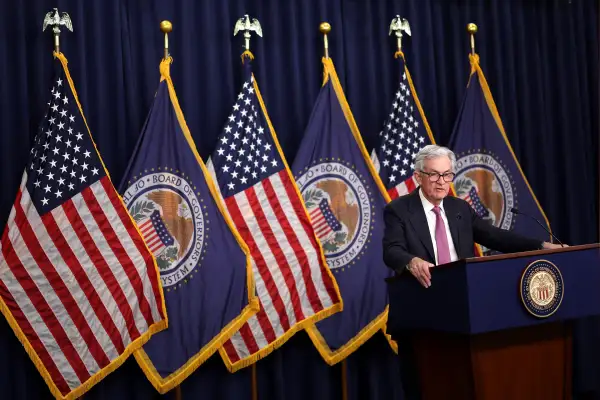The Fed May Pause Interest Rate Hikes. How Should You Prepare Your Investment Portfolio?
Money is not a client of any investment adviser featured on this page. The information provided on this page is for educational purposes only and is not intended as investment advice. Money does not offer advisory services.

After ten consecutive hikes, the Federal Reserve signaled earlier this month that it may finally stop raising interest rates. What would that potential pause mean for investors?
Over the past year, the central bank has been increasing the federal funds rate, which determines how expensive it is for banks to borrow from each other, to slow down price growth and prevent the economy from overheating. Now that inflation is slowly cooling, the Fed has indicated that it might be prepared to keep rates in their current target range of between 5% and 5.25% for the time being.
Earlier this month, the Federal Open Market Committee removed recurring language from its interest rate announcement suggesting that more rate hikes might be necessary, and Federal Reserve Chair Jerome Powell has suggested that recent stress in the banking sector could allow the Fed to stop hiking interest rates sooner than previously thought.
Even though Powell has also indicated that no decision has been made regarding the path of interest rates yet, many experts are anticipating a pause in rate hikes.
“We do expect a pause,” says Gargi Chaudhuri, head of BlackRock's iShares investment strategy in the Americas. “We think that the Fed will just stop here and see how the economy evolves, how inflation evolves, how the labor market evolves.”
Not everyone agrees. There has been ongoing internal debate among Fed officials about whether more hikes will be necessary, Bloomberg News reported this week, and the market isn't sure of the next move either. As of Friday, investors are pricing in a 20% chance that the Fed will actually raise rates again at its June meeting, according to data from the CME’s FedWatch Tool.
While no one has a crystal ball when it comes to interest rates, here's what investors need to know about a potential Fed pause.
A fed rate hike pause is not a pivot
The first thing to remember, Chaudhuri says, is that a Fed pause is not the same as a Fed pivot, which would involve cutting rates. She adds that investors shouldn’t expect rates to come down any time soon.
Chaudhuri notes that since the 1980s, Fed pauses have lasted about ten months on average. This time around could be longer or shorter.
“That will be completely determined by how the labor market as well as inflation progresses,” she adds.
Investors may be tempted to view the potential for rate cuts down the line as a buying opportunity, since lower rates mean it's cheaper to borrow money, which is good for corporate profits and tends to be good for stock prices, too. But experts are warning against that approach.
“Recent signs of persistent inflation suggest the Fed may instead keep rates elevated for longer,” writes Lisa Shalett, chief investment officer in Morgan Stanley’s wealth management division. Challenging economic conditions mean that a big spike in the stock market “based solely on the end of rate hikes does not seem plausible,” she adds.
In other words, don’t hold your breath for a bull market just yet.
Bonds may be attractive again
An interest rate pause could give some assets a boost, however. Chaudhuri points in particular to bonds, which had a dismal year in 2022 as the Fed continued to hike rates and prices plummeted. A pause could make bonds an attractive part of your portfolio again, she says. That's because with rates holding steady at a relatively high level, investors are gaining confidence that their bond holdings will generate stable returns.
Portfolio managers at PIMCO wrote in a recent market outlook that whether the Fed pivots or pauses rate hikes, history suggests fixed income can offer attractive returns potential, especially compared to stocks.
"An allocation to fixed income may help investors navigate a potential recession as well as uncertainty around the Federal Reserve’s policy trajectory," they wrote.
Stock investors should consider index funds
When it comes to stocks, Chaudhuri recommends focusing on investing in high-quality, profitable companies with healthy balance sheets given that a prolonged period of higher rates will likely contribute to an economic slowdown. Those stable companies will probably be more able to weather the storm.
For everyday investors who are wary of focusing on one particular sector or company, Betterment financial planner Kyle McBrien says an index fund, which tracks every stock in an index like the S&P 500, is another way to take advantage if there are upswings in the market as interest rates stabilize.
“We’ve seen the market rebound pretty significantly coming out of these rate pauses,” he says. “Something as simple as a market index can be a great place to just take advantage and ride that wave with the rest of the economy.”
Stick to your long-term plan
Even with strong signals from the central bank that rate hikes are coming to an end, there’s never any guarantee that things will shake out the way experts anticipate.
“It’s impossible to foresee the future,” says Diana Menaker, a private client advisor at J.P. Morgan Wealth Management. “Investors should avoid reacting impulsively and should stay focused on their long-term strategy, which should be built around their unique goals, risk tolerance and time horizon."
Will the Fed Cut Interest Rates Soon? Wall Street Can't Make Up Its Mind
The Fed Raises Rates Again — But Is This the Last Time?
How the Banking Crisis Could Help Fix Inflation — Without More Interest Rate Hikes

